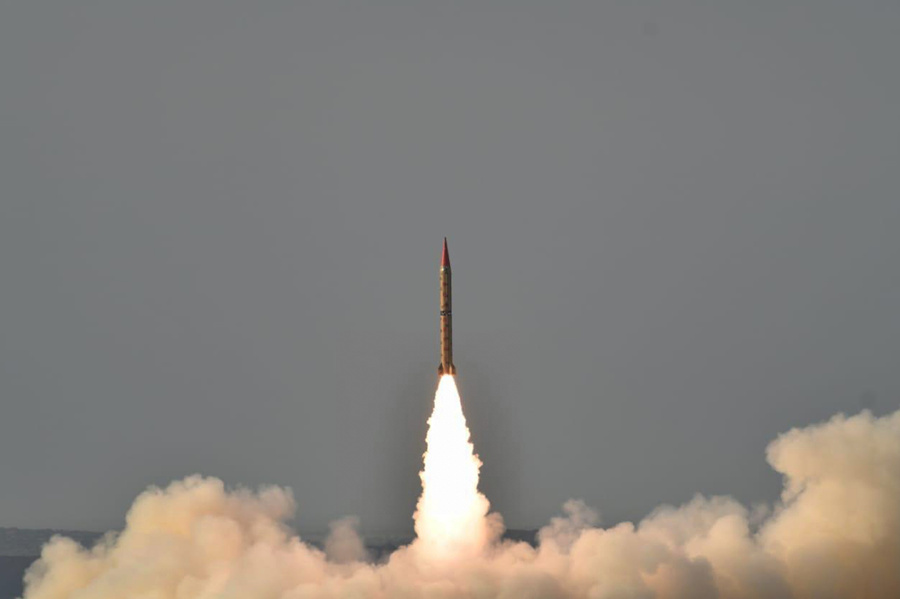
Photo released by Pakistan's Inter Services Public Relations (ISPR) on May 23, 2019 shows Shaheen-II, a surface-to-surface ballistic missile, being launched from an undisclosed location in Pakistan. (Xinhua/ISPR)
Officials and experts warned that the termination of the INF Treaty is a big blow to the global security system.
MOSCOW, Aug. 2 (Xinhua) -- Russia and the United States on Friday formally withdrew from the Intermediate-Range Nuclear Forces (INF) Treaty after accusing each other of violating the landmark arms control deal.
Experts warned that the termination of the deal would increase risks of an arms race which could threaten the international security.
ACCUSATIONS
"On Aug. 2, 2019, at the initiative of the U.S. side, the operation of the treaty between the Soviet Union and the United States on the elimination of medium-range and shorter-range missiles, signed in Washington on Dec. 8, 1987, was terminated," the Russian Foreign Ministry said in a statement.
U.S. Secretary of State Mike Pompeo said on the same day that the United States withdrew from the INF Treaty due to Russia's continuing violation of it.
"Russia is solely responsible for the treaty's demise. Dating back to at least the mid-2000s, Russia developed, produced, flight tested, and has now fielded multiple battalions of its noncompliant missile," Pompeo said.
The INF Treaty was signed in 1987 between the former Soviet Union and the United States on the elimination of ground-based intermediate-range and shorter-range missiles.
The White House said in February that it would suspend compliance with the pact with Russia. In response, Russian President Vladimir Putin announced that Russia would also suspend its participation.
Moscow and Washington have accused each other of violating the agreement in recent years amid increasing tensions.
Russia's noncompliance under the treaty jeopardizes U.S. supreme interests as Russia's development and fielding of a treaty-violating missile system represents a direct threat to the United States and its allies and partners, according to Pompeo.
Meanwhile, Russia has accused the United States of violating the INF Treaty by keeping intermediate range missiles as targets for air defense drills and by deploying in Europe air defense systems capable of launching intermediate range cruise missiles.
STABILIZATION MEASURES
By withdrawing from the INF treaty, Washington confirmed that it had taken a course towards the destruction of all international agreements that do not suit it, the Russian Foreign Ministry said Friday in a separate statement.
"This leads to the actual dismantling of the existing arms control system," the ministry said.
The termination of the INF Treaty as a result of Washington's withdrawal from it requires urgent measures to stabilize the situation and maintain the proper level of predictability in relations between Russia and the United States, it said.
The ministry recalled that Russia had already introduced a unilateral moratorium and will not deploy intermediate ground-based missiles in the regions where analogous U.S. missiles will not be deployed.
"We urge the United States to abandon the deployment of these classes of missiles they create, which, unfortunately, were actively discussed at the Pentagon, and to follow the example of Russia, taking all necessary steps to ensure global stability and predictability," the Russian ministry said.
Russia remains open to an equal and constructive dialogue with the United States regarding the restoration of confidence and the strengthening of international security, it added.
GLOBAL SECURITY
Officials and experts warned that the termination of the INF Treaty is a big blow to the global security system.
"Washington's decision to withdraw from the INF Treaty will have the most negative impact on global strategic security," Russian Deputy Foreign Minister Sergey Ryabkov told TASS news agency.
The United States' attempts to gain military superiority will only lead to increased confrontation, while prospects of unleashing a new arms race will increase, he said.
"The prospect that awaits us is that the arms control system can simply get off the agenda for a while," Valery Garbuzov, director of the U.S. and Canada Institute of the Russian Academy of Sciences, told RIA Novosti news agency.
He added that this does not mean that the entire security system will collapse, but the world is facing more risks.
"The termination of the INF Treaty will provoke an arms race, while the desire to create new types of weapons will lead to destabilization of security in Europe in the first place," Deputy Chairman of the State Duma Committee on Foreign Affairs Alexey Chepa told RIA Novosti.
"Naturally, this is a big blow to the entire world security system," he said.



